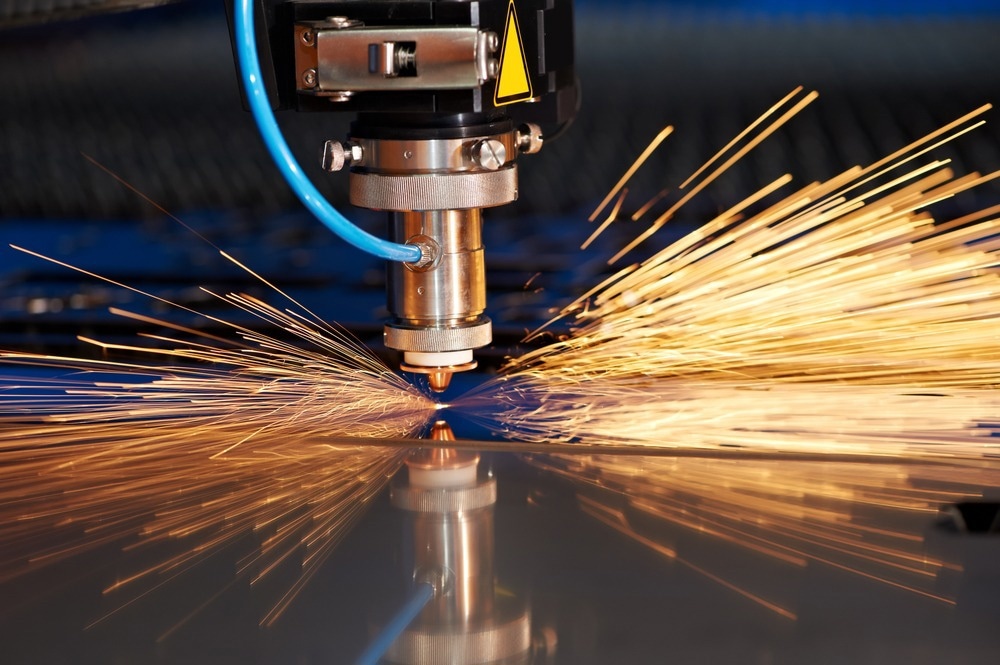Laser technology-based solutions are increasingly playing a critical role in important applications across industries. In this article, we discuss the laser technology market, its drivers, restraints, and opportunities, market insights, trends, and leading market players.
Laser technology is used extensively in different industries including chemical processing and production, healthcare, automotive production, and manufacturing, due to its high accuracy, productivity, sustainability, and adaptability.
Laser technology is used to develop new prosthetics and tools for healthcare applications, and healthcare equipment manufacturers can use lasers to design and develop new medical equipment conveniently.
Surgeons can easily perform complex surgical procedures, such as laser eye surgery, while physicians can offer superior treatment to patients using laser technology. Lasers can also identify counterfeit goods in clinics and hospitals.
In prostheses manufacturing, the use of laser technology has reduced production costs and increased production speed, allowing manufacturers to significantly increase their manufacturing capacities.
Laser technology is also utilized to produce nanomaterials with distinct chemical and physical characteristics. Several laser-based processes were developed for nanomaterial manufacturing, such as laser-assisted reduction, laser exfoliation, and laser ablation.
The aerospace industry uses laser technology to attain production and design flexibility and manufacture lighter components at lower prices. Several materials used in aviation, such as ceramics, polymers, and metals, are processed with high efficiency and accuracy using laser technology.
Drivers, Restraints, and Opportunities in the Laser Technology Market
Drivers
The global laser technology market was valued at US$ 16.7 billion in 2022 and is forecast to witness a compound annual growth rate (CAGR) of 8.9% to reach a value of US$ 25.6 billion by 2027.
Surging demand for laser-based solutions from the healthcare sector, rising production of micro- and nano-devices, extensive utilization of laser technology-based material processing techniques, and increasing adoption of different technologies based on the application of lasers, such as light detection and ranging (LiDAR), vertical-cavity surface-emitting laser (VCSEL), and augmented reality/virtual reality are the major factors driving the growth of the laser technology market.
Increasing investments by several governments in laser technology, technological advancements in photonics, growing demand for lasers in industrial applications, surging adoption of semiconductor optoelectronic devices such as light-emitting diodes (LEDs), and rising utilization of laser technology in the defense sector are also contributing to the market growth.
In healthcare, laser technology is increasingly used in ophthalmology, dentistry, dermatology, and urology. Health issues such as glaucoma, heart diseases, varicose veins, prostate problems, knee injuries, tumors, cancers, and kidney stones are treated with laser technology.

Image Credit: Terelyuk/Shutterstock.com
Moreover, laser technology is also used in noninvasive medical treatments, such as selective laser trabeculoplasty, photodynamic therapy, tattoo removal, skin rejuvenation, low-level laser therapy, and hair removal.
Medical laser systems are witnessing a higher demand owing to the growing incidence of eye-related disorders, increasing number of cosmetic surgeries, improving healthcare infrastructure, and rising share of the geriatric population.
Restraints
The high cost of deployment is a significant restraint to the growth of the laser technology market. Although laser processing reduces the workforce and other costs for manufacturing industries, the deployment of laser technology typically involves a high investment as lasers must be supported by different software, laser sources, durable parts, and design files. Moreover, the setup process and operation of laser technology solutions are complicated and require substantial resources, which is also hindering market growth.
Opportunities
The rising adoption of lasers for optical communication will create significant growth opportunities for the laser technology market. Optical communication utilizes light as a transmission medium. Laser technology offers advantages over radio waves as light waves are packed more tightly than radio waves.
Thus, laser technology can allow significantly higher data transmission per second with robust signal quality. Efficient communication systems with enhanced speed and bandwidth, reduced price, and compact size can be developed by deploying laser technology.
Market Insights by Type, Applications, End-User, and Region
Type
Solid, gas, and liquid lasers are the three primary laser types. Solid lasers have retained the leading share in the laser technology market due to the growing demand for pulsed lasers in several healthcare applications. Multiple cosmetic procedures, such as skin resurfacing, scar removal, and melasma treatment, use solid-state pulsed lasers.
Semiconductor lasers are used extensively in different applications in the military, communications, and industry due to their low energy consumption, extended service duration, high reliability, lightweight, and compact volume.
Moreover, semiconductor lasers use a low voltage continuous current power supply mode, which leads to minimal maintenance costs, safe operation, and a low pellet failure rate. Semiconductor lasers, such as blue and green lasers with shorter wavelengths and red and infrared lasers with long wavelengths, are used to increase the measurement precision and range of a laser particle size meter.
Applications
Optical communication and laser processing are the key applications of laser technology. Laser processing has accounted for the highest share of the laser technology market due to the surging adoption of material processing applications. In the laser processing market, macro processing has retained the largest share.
Laser welding is used in several industrial applications, including for exquisite jewelry production.

Image Credit: Dmitry Kalinovsky/Shutterstock.com
Optical communication has retained a minor share of the laser technology market.
End-Users
The global laser technology market can be segmented into research, medical, automotive, defense, aerospace, industrial, electronics and semiconductor, commercial, and telecommunication end-users.
The automotive industry has accounted for the largest share of the laser technology market due to the increasing utilization of laser cutting by automakers to manufacture error-free high-quality products.
Laser cutting can ensure quality cuts with lean edges in a fast cycle time. Additionally, laser cutting technology is also used for branding, engraving, cladding, and welding in the automobile industry.
Regions
North America has retained the leading share in the global laser technology market due to the rising number of cosmetic procedures, increasing adoption of sophisticated technologies, and the presence of several key market players such as IPG Photonics Corporation and Coherent Inc. These companies are improving the demand for laser-based solutions in consumer electronics and defense by introducing novel laser-based technologies.
Asia Pacific retained the second largest share in the market in 2021 owing to the growing number of laser centers and original equipment manufacturers, improvement in healthcare infrastructure, and expansion of manufacturing and electronics industries in the region.
Europe has accounted for the third-highest share due to the presence of several state-of-the-art laser solution suppliers, the growing adoption of laser technology in all industries, and notable government investments in research and development of laser technology.
Leading Players in the Laser Technology Market
The laser technology market is fragmented in nature, with the presence of several medium and large players. Key players in the market include Bystronic Group, Corning Incorporated, LaserStar Technologies Corporation, LUMIBIRD, Novanta Inc., Jenoptik, Lumentum Operations, TRUMPF, Gravotech Marking, Solaris Laser S.A., Photonics Industries Inc., eurolaser GmbH, Han’s Laser Technology Industry Group Co., Access Laser Company, and Lumenis Ltd.
These players are adopting different strategies, such as strategic contracts and agreements, mergers and acquisitions, and development, testing, and introduction of effective laser technology solutions, to grow and expand their operations. For instance, TRUMPF introduced an automated loading solution for laser tube-cutting machines in 2022. The new solution can transfer tubes automatically from the storage system to the tube-cutting machine to improve productivity and reduce downtime.
Latest Trends in the Laser Technology Market
Rising implementation and investments in smart factory solutions are expected to fuel the growth of the global laser technology market. The advent of smart factory solutions and Industry 4.0 has resulted in improved efficiencies, increased output, higher cost benefits, improved quality, and enhanced production capacity for manufacturing industries.
In the Industry 4.0 concept, laser technology will play a crucial role in different mechanical applications. Moreover, most of the laser-based Industry 4.0 applications will feature advanced technologies, such as machine learning, cyber-physical systems, cognitive computing, cloud computing, artificial intelligence, and the Internet of Things.
Final Thoughts
Laser technology has become integral to several industrial and healthcare applications. In the upcoming years, laser technology will play a critical role in optical communications and Industry 4.0.
More from AZoOptics: The Current and Future Direction of the Optical Microscopy Market
References and Further Reading
Laser Technology Market: Global Industry Analysis and Forecast (2022 – 2029) [Online] Available at https://www.maximizemarketresearch.com/market-report/global-laser-technology-market/25098/ (Accessed on 20 January 2023)
Laser Technology Market Size, Share & COVID-19 Impact Analysis [Online] Available at https://www.fortunebusinessinsights.com/laser-technology-market-104483 (Accessed on 20 January 2023)
Laser Technology Market, By Type (Solid Laser, Liquid Laser, Gas Laser), By Application (Laser Processing, Optical Communication), By End-Use (Telecommunication, Industrial, Aerospace & Defense), and By Region Forecast to 2030 [Online] Available at https://www.emergenresearch.com/industry-report/laser-technology-market (Accessed on 20 January 2023)
Laser Technology Market By Type (Solid, Liquid, Gas), Product (Laser, System), Application (Laser Processing, Optical Communication, Optoelectronic Devices), Vertical (Telecommunications, Industrial), and Region -Global Forecast to 2027 [Online] Available at https://www.marketsandmarkets.com/Market-Reports/laser-technology-market-795.html (Accessed on 20 January 2023)
Laser Technology Market Size, Share & Trends Analysis Report By Type (Solid-state Lasers, Gas Lasers, Liquid Lasers, Semiconductor Lasers), By Product, By Application, By Vertical, By Region, And Segment Forecasts, 2023 – 2030 [Online] Available at https://www.grandviewresearch.com/industry-analysis/laser-technology-market-report (Accessed on 20 January 2023)
Disclaimer: The views expressed here are those of the author expressed in their private capacity and do not necessarily represent the views of AZoM.com Limited T/A AZoNetwork the owner and operator of this website. This disclaimer forms part of the Terms and conditions of use of this website.